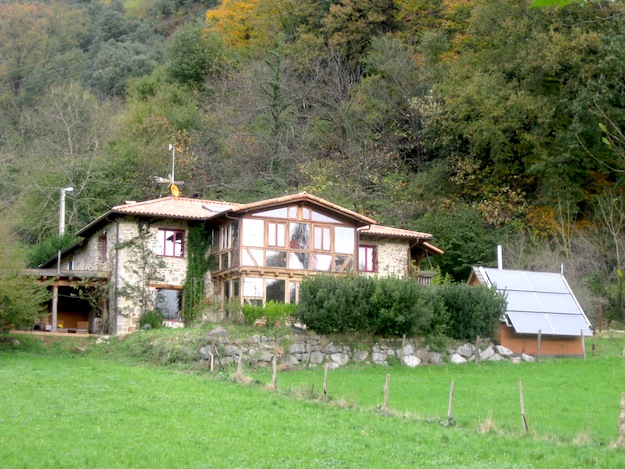How to Become a House Sitter




Note: this is an updated and expanded version of a post we originally published in 2013.
Even though our travels have taken us to six continents and more than 75 countries, we set out with the intention of biding our time in various select destinations. We look at travel as a long distance event, not a sprint, and didn’t want to burn out chasing around the world.
Twice we’ve chosen house sitting, or as some call it, house minding, as a way of making a temporary home. Both times were in Spain – Spring 2012 in Murcia and Winter 2012-13 in Cantabria. House sitting pportunities for home sitting in Spain are numerous, we found, because of the large population of expats, especially from Britain.
In both these cases we found our connections through international house sitting websites such as Trusted House Sitters. We were also listed with Mind My House.
See below for a more complete list of house sitting sites.
Table of Contents
How to become a house sitter
Be aware that there are more than these two platforms that aggregate home sitter jobs. Be sure to check several before you pay to join. They vary greatly in breadth of offerings, what countries they specialize in, and how many listings they feature. Be sure if you’re interested in house sitting jobs in Europe, you don’t pay to join a site that specializes in house sitting in Asia.
Registering at a house sitting web site, naturally, is pretty much essential. That’s where the homeowners find house sitters – and where you’ll go about finding a house to mind.
Create an enticing house sitter profile
The first thing you want to do to get house sitting jobs is create an engaging profile. Be sure to list any previous experience you have as a homeowner or house sitter. List any relevant skills. Are you handy with tools? Do you never forget to water the plants? Can you fix a toilet? Be sure to say so. Do you speak any foreign languages? At this time, it’s also a great idea to tell your potential homeowners how much you love pets. In general, it’s very important to convey your enthusiasm. Don’t forget to mention that you are animal lovers. (Did I say that before? Say it twice, too.)
A common feature of the house sitting web sites is the trust profiles of the potential sitters. It’s a bit of a “Catch 22.” It’s hard to build your trust profile via recommendations on the site until you’ve actually had a house sitting gig. So, you might need to take less than ideal sits for a while until you build up a reputation–and become a likely candidate for the more desirable sits in places like London or Paris. In the meantime, if your site accepts them, solicit recommendations from former landlords, business associates–especially bosses, old neighbors, and anyone else who can vouch for your reliability. If the site itself doesn’t allow third party references, be sure to have them ready to send to a homeowner on your own.
What type of house sit are you looking for?
More things to consider before you start your house sitting search:
Think about how long you want to sit. Will you takes house sitter jobs of a week or less, or are you only interested in long term house sitting jobs? For our purposes, we would consider positions of no less than a month, and no more than three, mostly due to travel expenses and visa limitations, but also because of our low boredom threshold.
If you’re sitting in a foreign country, be sure you have permission to stay in that country for the length of your sit. For an American considering house sitting in Europe (the Schengen Zone), for example, you generally get 90 days on your visa. There are situations where you can extend, but be very careful of telling the immigration authorities that you are “working” as a house sitter. That opens another whole can of complications, as getting a work permit is a lot harder than being a tourist.
Do you want luxury house sitting jobs? Then be honest and your potential homeowners about their home amenities. Don’t expect a pool and a sauna if you don’t ask.
Do you need to be paid to house sit? Those opportunities are very rare. The going rate for house sitting is effectively zero. You are basically house sitting in exchange for rent. If you need to make money while you home sit, you’re probably better off looking into part time jobs in the area. Bartending, anyone? But realistically, your house sitting chores won’t allow for other outside work.

Once you look into house sitting opportunities, you’ll quickly realize it isn’t just the house that is your concern. It’s the dog and the home. Homeowners, yes, do want someone who will care for their home, but mostly they want your love, adoration, and undivided attention for their animal family. It’s important to know this before embarking on your adventure. Yes, in so many cases, house sitting is really pet sitting.
Also, take good stock of what you’re looking for in the house itself. Is it luxury house sitting? There are opportunities to stay in elaborate digs. Or are you happy with a small apartment in a great location? If the location is remote, is a car provided to run errands? Are there neighbors or staff who will be checking on you? Are you responsible for other personnel? Know yourself well enough to select a situation that won’t drive you crazy. Be prepared to be happy where you end up.
House sitting web sites
- Trustedhousesitters.com (€119-239 – $129–259 USD annual fee depending on features.) Trusted Housesitters is the site we’ve used to get both our house sits. They seem to particularly be oriented toward pet sitters and have most of their listings in North America and Europe.
- Mindmyhouse.com ($29 USD annual fee) is the cheapest site to join and, as such, might be a good place to start your search. Fewer house sit listings than Trustedhousesitters, so the competition for a sit might be higher.
- Nomador.com (From €79 to €179 – $99-199 USD) has lots of sits in Europe and is building more around the world. They heavily emphasize their “Trust Profile” and give pretty good instructions of how to build a profile that will get your applications accepted. Nomador has probably our favorite web interface, too.
- HouseCarers.com ($50 USD annual) seems to have a lot of listings for Australia, New Zealand, and the United States.
Once you’ve signed up, monitor your chosen house sitting web site(s) frequently. Many have email notice features. Also, you should follow the website’s social media. And if a house sit pops up that fits what you’re looking for, respond to the query immediately. Being first is a big advantage to getting the popular sits.
If you see one you like, be sure to respond as fast as possible, and craft your response to the specific listing. If they have a horse, talk about your horse experience. (That actually got us a great sit once.) Are you a cat lover? If the house is a bit older, be sure to mention your handyman skills. If they have a garden, show them your green thumb.
The selection process – for both sides – will no doubt involve an interview. If the homeowner doesn’t ask for one, you should insist. It will probably be done on Skype. Some questions you should be sure to ask are: Can you have guests? How’s the WiFi? Can you leave the house over night? Is there a car you can use? (The last one is pretty essential if the sit is outside of a city.)
In general, house sitting is much more competitive now than it was six or seven years ago. Be prepared to “sell” yourself to the homeowner. They probably will have lots of options, so do your best to stand out from the crowd.

Here are some other points worth considering before you involve yourself in a house sitting situation.
The Pros of House Sitting
- Pay no rent. It’s good to save money.
- Enjoy the comforts of home while you are on the road. These might be the things you dream of when you’re fed up with hotels: laundry (wheee!), Wi-Fi (a must for us), a kitchen (more on that), and comfortable furniture for quality lounging outside of bed.
- Other homey touches: having been a homeowner, I like seeing the details of the house itself, the art on the walls, the books and music on the shelves, the plants and gardens. I’m not a peeper, and find happiness in ignoring jammed closets.
- Having a kitchen takes you to the local markets and the freshest local food, which vastly improves your diet. Of course this is cheaper than eating out all the time, too. (As we said above, saving money is good.) The owners’ kitchens are invariably better equipped than rental property. But I still always carry a cork screw and knife when I travel.
- Use of a car. Doing the homeowners’ errands can be a good way to learn your way around and meet people. You’ll pay for the gas to do that, but mostly the car will allow you some freedom to see the neighborhood with day trips.
- You can be a regular at a couple local haunts, talk to people, and find out much more about the region than you would otherwise. Ask for recommendations. And use them.
- The animals’ affection. Nothing says home better than a dog’s pushy wet nose and pleading eyes. And, like grandparents, you can spoil the critters, then leave them with the owners when you move on.
- A routine can be a good thing. Walking dogs, feeding animals, and the general upkeep of a house fall into a gentle routine that allows the house-sitter to recoup, recover, and work on special personal projects. We catch up on work, on travel plans, on sleep, on reading, and sometimes on entire television series via our laptops.
The Cons of House Sitting
- You are probably confined to the pet care schedule. Forget overnight trips. (Note to self: in the future, ask in advance if there is someone who could relieve you for one night, for a little weekend getaway.)
- You are likely going to be at your site during the off-season. There is a reason owners leave, so consider the weather and seasonal closures. The beach town is probably cold and deserted while you are there.
- You are responsible when things go wrong. Things will go wrong. Broken showers need to be fixed. Sick animals need to be cared for. Power goes out, supplies run low. This is your job and you can’t run away. If you are handy, you can fix a few things yourself. Ask your owner if they have a basic tool box.
- Corollary to the above, you may have to advance the homeowner money in order to get things fixed. We chose to pay a water bill rather than have our water shut off, for example.
- It’s not all free. Don’t forget the expenses you’ll incur. Gas, groceries, meals out, and any utilities you’ve been asked to pay begin to sound like rent. Speeding tickets and replacing broken goods like, oh, let’s say a rice cooker you burned up, increase the tab. Utilities, in particular, are worth discussion. We believe our pet sitting services are saving the pet owners plenty, and that utilities should be paid by the homeowner. Homeowners sometimes want guarantees that you won’t crank their heating (or AC) bill through the ceiling. Settle this in advance.
- You don’t know your neighbors and the local environment until you are there. The condition of the home, the location within its community, and the neighbors’ opinion of transients (that’s what you are) or dogs are never fully known until you are on site and committed. As much as you can, ask about these things first.
- Flexibility and self-sufficiency are required. No matter how good the instructions, you’ll have to find and figure things out for yourself. No matter how clear the advance plans, dates and travel plans do change.
- The web sites that facilitate these connections are much more geared to vetting the house-sitter than the home owner. Take your time talking to the prospective home owners before booking your flight.
Our best advice? Expect the unexpected. Dogs will run away. Toilets will clog. Enjoy the home and kitchen. Treat the animals well. And treat the home as if it were your own. Take care of all that and you’ll end up with a great recommendation you can use to get your next house sit.
Oh, and get out and visit the area as much as possible. You are still a traveler.
When you’re thinking of traveling, your first stop should be our Travel Resources page, where we list all the essentials you need to make your travels easier, cheaper, safer, and more fun.
You can also help yourself get ready for your travels by reading our Get Started Planning Your Trip Now page.
We love traveling–with the right gear. We’ve gathered a lot of the stuff we use to make travel more pleasant and efficient all on one page. Shop our Travel Past 50 Amazon page to find our favorite gear. If you purchase something from the store, Travel Past 50, as an Amazon affiliate, may receive a small commission at no extra charge to you. Thanks.
We never leave home without our travel insurance. Nor should you. Search for the travel insurance from Allianz that best meets your needs, whether it be an annual plan or a single trip.
You can see (and buy prints) of most of our travel photos in one place on this page.
Note: This post and other posts on TravelPast50.com may contain paid or affiliate advertising links. As an Amazon Associate we earn from qualifying purchases.
In a world where financial habits vary widely, the spending behaviors of the wealthy stand out as particularly intriguing.…
Copyright © 2024 Retiring & Happy. All rights reserved.








